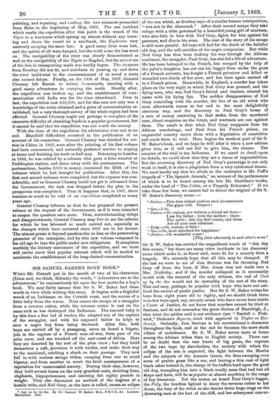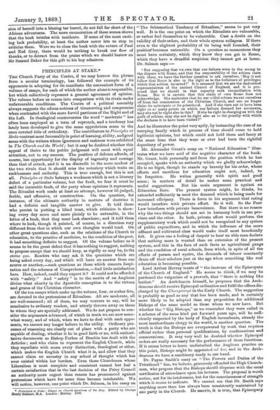SIR SAMUEL BAKER'S BOYS' BOOK.*
WHEN Mr. Disraeli put in the mouth of two of his characters (Ixion and, we think, Sidonia) the words, "Adventures are to the adventurous," he unconsciously hit upon the best motto for a boy's book. We may fairly assume that Sir S. W. Baker had those words in view while writing this story. It begins with a frightful wreck of an Indiaman on the Cornish coast, and the rescue of a little baby from the waves. Next comes the escape of a smuggler from a revenue cutter, while the revenue cutter is cast on the same rock as has destroyed the Indiaman. The rescued baby is by this time a fine lad of twelve, the adopted son of the captain of the smuggler, and with his supposed father he helps to save a negro boy from being drowned. After this, both boys are carried off by a pressgang, serve on board a frigate, join in the capture of a French man-of-war, form part of the prize crew, and are wrecked off the east coast of Africa. Here they are deserted by the rest of the prize crew ; but they build themselves a raft, provision it with turtles, and make their way to the mainland, catching a shark on their passage. They now fall in with various savage tribes, escaping from one to avoid bigamy, and from another to avert the fatal consequences of a reputation for unsuccessful sorcery. During their stay, however, they hold several hunts on the very grandest scale, shooting lions, elephants, hippopotamuses, and catching fish eighty pounds in weight. They also disconcert an ambush of the negroes of a hostile tribe, and Ned Grey, as the hero is called, causes an eclipse of the sun which, as Southey says of a similar human interposition, "was not in the almanack." After their second escape they take refuge with a tribe governed by a beautiful young girl of nineteen, who also falls in love with Ned Grey, fights for him against his pursuers, and dies in his arms. The rest of the story of his escape is still more painful. All boys will feel for the death of the faithful old dog, and the self-sacrifice of the negro companion. But while Ned Grey has thus been making his way through the African continent, the smuggler, Paul Grey, has also led a life of adventure. He has been betrayed to the French, has escaped by the help of the jailor's daughter, has cut out his lugger from under the guns of a French corvette, has fought a French privateer and killed or wounded two-thirds of her crew, and has been again carried off to a French prison. Meanwhile, in England, a murder has taken place on the very night in which Ned Grey was pressed, and the dying man, who was Ned Grey's friend and teacher, uttered his name with his dying lips. The sudden disappearance of Ned Grey coinciding with the murder, the lies of an old witch who soon afterwards comes to her end in the most delightfully atrocious way, and the discovery in Paul Grey's house of a sum of money answering to that stolen from the murdered man, direct suspicion on the Greys, and warrants are out against them. The result is that when Ned Grey reappears from his African wanderings, and Paul from his French prison, an ungrateful country meets them with a deputation of constables and sends them to trial. Here begins the weakest part of Sir S. IV. Baker's book, and we hope he will alter it when a new edition gives him, as it will not fail to give him, the chance. The account of the trial is too ludicrous. If we cared to dwell upon its details, we could show that they are a tissue of impossibilities. But the crowning discovery of Ned Grey's parentage is not only weak in itself, it is also a plagiarism from a very celebrated drama. We need hardly say that we allude to the underplot in Mr. Puff's tragedy of "The Spanish Armada," an account of the performance of which is to be found among the late Mr. Sheridan's works, under the head of "The Critic, or a Tragedy Rehearsed." If we take these few lines, we cannot fail to detect the original of Sir S. W. Baker's discovery scene : "Justice.—This does indeed confirm each circumstance
The gipsy told. Prepare !
"Son.—I do.
"Justice.—No orphan, nor without a friend art thou—
I am thy father ; here thy mother ; there Thy uncle ; this thy first cousin, and those Are all your near relations.
"Lady.—Oh, ecstasy of bliss ! "Son—Oh, most unlooked-for happiness!
"Justice.—Oh wonderful event !
[They faint alternately in each other's arms."
Sir S. W. Baker has omitted the magnificent touch of "this thy first cousin," but there are many other incidents in his discovery scene which make it, as Sneer said, more fit for a comedy than a tragedy. We sincerely hope that all this may be changed. If the last we were to see of Jern Stevens was his thrusting Ned Grey off from the boat, if Mrs. Jones was not made into a Mrs. Nickleby, and if the murder collapsed as it necessarily would with the removal of the only witness, the end of Cast up by the Sea would not be unworthy of the rest of the story. This end may, perhaps, be popular with boys who have not outlived the sweets of poetic justice. But Sir S. W. Baker writes for boys from eight years old to eighty, and we should think there were few boys aged, say, seventy-seven who have never been inside a Court of Justice, do not know that murders cannot be tried at Sessions, and do not remember the great dictum of Stareleigh, J., that what the soldier said is not evidence (see "Barden v. Pickwick," Dickens's Reports, cited with approval in Taylor on Evidence). Seriously, Jem Stevens is too conventional a character throughout the book, and at the end he becomes the mere stock villain of melodrama. Sir S. W. Baker seems more at home among the African tribes than in English society. There can be no doubt that the vast hunts of big genie, the capture of the two boys by slavedealers, the anxiety with which the eclipse of the sun is expected, the fight between the Mazita and the subjects of the Amazon Queen, the fires sweeping over acres of prairie grass like a sea, and leaving a thin coat of light black ashes behind it, the charge of the buffalo herd upon the good old dog, trampling him into a black woolly mass that had lost all shape and form, will be as popular as almost anything in the range of boy literature. Yet the scenes on board Paul Grey's lugger, the Polly, the bonfires lighted to decoy the revenue cutter to her doom, the fury of the witch as she throws down huge crags on the drowning men at the foot of the cliff, and her subsequent conver sion of herself into a blazing tar barrel, do not fall far short of the African adventures. The mere enumeration of these scenes shows that the book bristles with incidents. If some of the most exciting lack probability, at least the author never lets us stop to criticize them. Were we to close the book with the return of Paul and Ned Grey, there would be nothing to break our flow of thanks, or to detract from the praise which we should bestow on Sir Samuel Baker for this gift to his boy admirers.











































 Previous page
Previous page